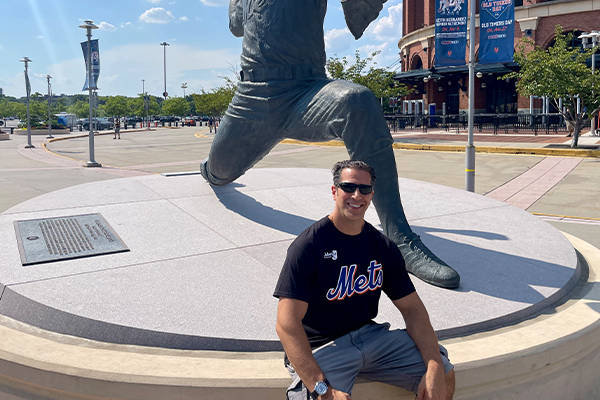Taking the fight to Alzheimer’s
“Though those with Alzheimer’s might forget us, we as a society must remember them.” —
Scott Kirschenbaum, filmmaker
Alzheimer’s disease is a debilitating neurological condition that was identified by German psychiatrist and neuropathologist Alois Alzheimer in 1906 when he analyzed the brain of the late Auguste Deter, a patient at an asylum in Frankfurt, Germany, who had experienced signs of memory loss and problems with language and behavior. (Some critics later concluded she might’ve been suffering from something else, including vascular dementia, caused by issues with blood flow to the brain, such as in mini strokes, or metachromatic leukodystrophy, an enzyme deficiency.)
Dementia — the umbrella term for a group of disorders resulting from disease, injury and/or genetics and characterized by devastating cognitive impairment — is a major cause of dependence, disability and mortality. Current estimates suggest that 44 million people live with dementia worldwide. This is predicted to more than triple by 2050 as the population ages, when the annual cost of dementia in the United States alone may exceed $600 billion. (The cost to caregivers, many of whom receive little in the way of financial or psychological support, is incalculable.) Low- and middle-income populations look to be most at risk for the largest increases as they have higher patterns of diabetes and cardiovascular diseases such as high blood pressure, which affect certain kinds of dementia.
Alzheimer’s disease, which can only be truly diagnosed through an autopsy, is now the most common type of dementia in the United States, accounting for 50% to 60% of all cases, again with a disproportionate effect on minority populations. Alzheimer’s is characterized by certain changes in the brain, specifically amyloid plaque deposition and neurofibrillary tangles (NFT) of hyperphosphorylated tau.
Interestingly, Alzheimer’s begins deep in the brain so that these pathophysiological hallmarks may start to appear as early as 10 to 20 years prior to the onset of symptoms and then gradually spread to other parts of the brain. The main symptoms of Alzheimer’s and other forms of dementia include an incremental increase in memory loss, a shortening of the attention span, personality changes, being uncomfortable in new situations and having difficulty organizing thoughts, learning new things, writing, reading, using numbers and even speaking.
An estimated 5.4 million Americans have Alzheimer’s disease. Today, someone in the country develops Alzheimer’s disease every 66 seconds. According to the Alzheimer’s Association, by 2050, one new case of Alzheimer’s is expected to develop in half that time, resulting in nearly 1 million new cases per year or 13.8 million, fueled in large part by the aging baby boom generation.
Treatment
Unfortunately, there are still no disease-modifying treatments. With this being said, the best intervention strategies are those that catch dementia early. Epidemiological evidence suggests education and physical exercise may protect against certain kinds of dementia, whereas mid-life hypertension and diabetes influence the risk of something like vascular dementia. Low-cost lifestyle measures that promote brain health, stop ongoing degeneration, repair neuronal damage and prevent cognitive disability are at the forefront of the discussion of dementia prevention. Many interventional studies are moving their focus to cognitively healthy individuals at risk of developing Alzheimer’s and other forms of dementia (before substantial irreversible neuronal network dysfunction and loss, associated with overt clinical symptoms, have occurred) as the best strategy to reduce the disorder’s incidence and prevalence.
From a nutrition standpoint, the Mediterranean and DASH (Dietary Approach to Systolic Hypertension) diets have been shown to slow cognitive decline. The MIND (Mediterranean-DASH Diet Intervention for Neurodegenerative Delay) and DASH) are known for recommending a high consumption of leafy green vegetables as well as nuts, berries, beans, seafood and poultry, among other foods.
Something to think about
If our society really wants to face this issue head on, then we need to meet it at the beginning stages and even well into its pre-stages. Making healthy lifestyle choices — eating nutritious foods and exercising more — at an early age is a start. What complicates things is that as individuals age, they may put less effort into healthy behaviors, such as exercise, due to pain, discomfort or suboptimal beliefs.
But this is not merely a question of eating and moving well, particularly in our digital age of anxiety. Stress may play a factor. The biggest challenge, however, might lie with a technology that seemingly does everything for us, skewing our brain patterns and attention span in the process. According to a recent New York Times interview with Richard Restak, M.D., a neurologist and clinical professor at George Washington Hospital University School of Medicine and Health and author of “The Complete Guide to Memory: The Science of Strengthening Your Mind,” lack of retention — the memory loss that is the attribute most associated with dementia — is in part lack of attention. And paying attention is hard for those who want everything at once in short internet bursts. (He also recommends doing something fewer people do anymore — read books, particularly novels, which force you to concentrate and remember timelines.)
The most efficient strategy that we can employ is to move from treatment to prevention. Even if the onset of dementia can be delayed for only a few years, this would affect our society and its health greatly. Exploring how lifestyle choices influence risk is more important than ever.

Reach Giovanni at giovanniroselli.com.